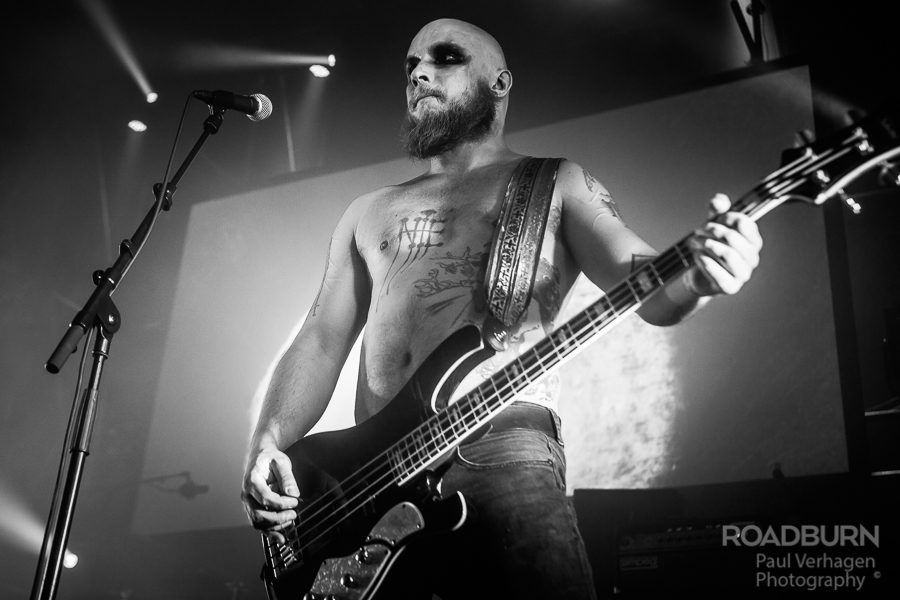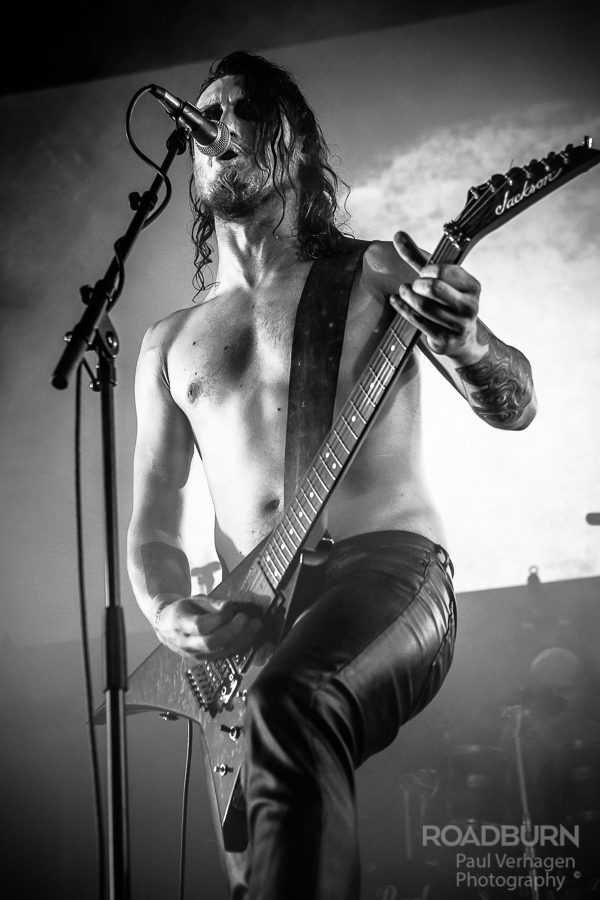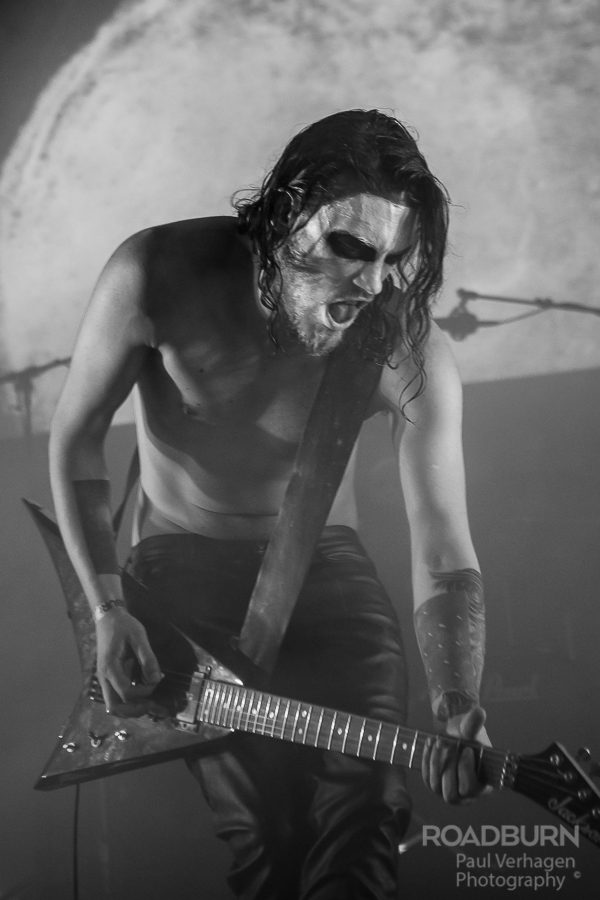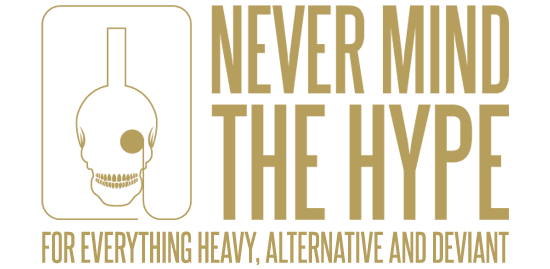
Furia op Roadburn 2018, foto Paul Verhagen
Je houdt ervan, of je vindt het niks. Furia is geen band voor iedereen, maar de Polen zoeken continu naar nieuwe expressie binnen hun domein van black metal en folkmetal. Nekrofolk, zo heet het geluid, waarin de groep inderdaad de ‘necro sound’ van black metal combineert met folky passages. Een intrigerende combinatie. Het is alweer even geleden dat de plaat ‘Księżyc milczy luty’ werd losgelaten op de wereld. Deze release laat horen hoe de groep echt nieuw terrein betreedt en het black metal stigma begint af te werpen. Reviews laten interessante vergelijkingen zien. Nog meer bijzonder is de EP die de band uitbracht. ‘Guido’ werd diep ondergronds opgenomen in een van de mijnen die de thuisregio Silezië zo typeren. Een regio met een bijzondere geschiedenis.
Door Guido Segers
Tijdens Roadburn 2018, mocht ik Nihil en Sars spreken over deze platen en hun afkomst. Het is meteen duidelijk dat we met bijzondere persoonlijkheden te maken hebben. Nihil verbergt zich achter een zonnebril en rookt de ene sigaret na de ander. Als hij spreekt is het traag en binnensmonds. Tijdens het gesprek leeft hij op, als de interessantere onderwerpen langs komen. Sars is meer het stille, intense type, dat dwars door mensen heen kijkt en spreekt met een dringende directheid.
Het in november 2016 uitgebrachte laatste album:
(Dit interview is oorspronkelijk voor Echoes & Dust gedaan en daarom verder in het Engels)
How was it to play Roadburn for you?
Nihil: It was almost perfect. I didn’t like the beginning of the show, there were some problems with the sound. I didn’t like that it was daytime, but the show got better as we went and the last song felt like a full 100% for me. I really enjoyed it, people seemed satisfied.

Furia op Roadburn 2018, foto Paul Verhagen
Your last song, was that a very personal experience?
Nihil: The last song is very important. For me personally, as during the live set, this is a kind of ‘wydinia’, a release of what we have inside of us. I don’t know why, but it is perfect for the end. You can’t put it to words. Every song is a personal expression, yet that song is special to us.
As I hear your music, it’s very hard to put you down in a genre box. Do you feel that a festival like Roadburn is the right fit for a band like Furia to play?
Nihil: Yeah, I think every festival is right for a band like Furia, because we’re just playing music. For me it is just music at least, so we play different festivals like OFF festival or Primavera in Barcelona. I think you can say pop festivals?
Sars: One festival we were playing featured a post-black band and a pop artist from Poland and we were in between, and that was ok.
Would you prefer this to an exclusively black metal festival, since you are usually put in that category?
Sars: Actually, I don’t like black metal festivals, because it is so narrow-minded. It doesn’t fit for us.
What is often used for your music, and I’m curious where it comes from, is the term ‘nekrofolk’?
Nihil: Hard to say, what inspires us is not different bands so much. Sure, we pick up their influences, but that’s not the main thing. Most important for us is our lives, where and how we live. That is very special for us because we live in an area that is both industrial and very green. It is very weird to have those two things, I’ve never seen a similar place anywhere. I think that’s why we are strange.
Could you then say that the term is a combination of the two elements, that the nekro represents the industrial barren and folk the green?
Nihil: I think that nekro is us, we are nekros. We are dead.
That requires some explanation, why are you nekro?
Nihil: I don’t know… (turns to Sars) Why are we nekro?
Sars: We are not useful for society. It’s hard to explain, but like Nihil says, we are playing nekrofolk because we are from Silesia. Of course, when we started we wanted to play black metal and we listen and play in many black metal bands. Now, that is not the most important thing. We want to express ‘us’.

Furia op Roadburn 2018, foto Paul Verhagen
I get from that that you have shaped your music into something very much more personal, strongly based on where you are from. I am interested in where you are from, can you describe Silesia as your place?
Nihil: You have to come see it. It’s industrial and the mentality is different.
Sars: Historically, the region belonged to everyone. It has influences from Czech, German, Polish and other owners and that has shaped it in a way. Silesians became their own sort of people because of that. When the Germans invaded Poland and took over Katowice, one of the biggest cities of Upper Silesia, there were people firing at them and others waving and welcoming the soldiers as if they were part of them. It’s complex to this very day because there are still people who might not feel German but have a strong kinship with all these nations. They’re not from anywhere really but from Silesia. These days, when nationality is very important in Poland for the government, saying you are Silesian is a controversial thing.
So to round up, Silesian identity is shaped by its history, gaining a very distinct identity due to not really being a part of any other nation? As I understand, you also derive a lot in your music from that history and folklore. What sort of stories or ideas are those?
Nihil: I think it is not so much about stories, but more our feelings about these.
Sars: We are part of those stories and we want to create new ones. Not just about our area, but also about us. We use parts of that local folklore but in our own way. We tell them through our own perspectives and experiences.
As I understand it, you don’t view yourself as part of the black metal scene or any scene at all really. You’ve also stated that as a musical entity you are hermetic. How big or small is that unit, to what does it extend or is there any kinship that fits in your circle with other artists?
Nihil: It’s just us, not some group of people. There are some bands in Poland we are close to in such way, but it’s more on a social level and not coded with rules. We really just play our own stuff without plans of getting bigger.
Does that help to hold on to the identity, that you consciously control what comes into your work?
Nihil: Actually, I think we are starting to control that, but earlier it was much more unconsciously. We were not really in control, just drunk and playing all the time. Now, we are getting older and more mature, more aware of what we want to specifically do.
I would like to talk about your latest record a bit too and I am particularly fascinated by the release ‘Guido’, recorded hundreds of meters underground in a Silesian mine with that same name. How did this idea come about and how did it all got done?
Nihil: For us, this idea came very naturally because the coal mines are for us a regular thing and part of our industrial region. Mining culture is a part of the Silesian environment we come from. When we saw it was possible to record a record down there, we just did it.
Sars: It just makes sense, because when people think about Silesia, they think of Germans and coal mines. It was obvious we had to go underground to record it.
Wasn’t it a challenge to get down there and did you write your songs with a specific feeling to them?
Nihil: It was our first time down there and obviously it was technically hard to get our stuff down there. We only had one day to record, but that went rather well. I didn’t feel very unusual down there, just very focused and I didn’t think about anything else. In one way it was like every recording, but I can’t put to words the uniqueness of the experience.
Sars: We were prepared for that, we knew we had one day and so our mindset was set to do it. There were interesting situations though, like the typical elevator that was used by miners years ago, which had 3 levels and on every one was a part of our equipment.
Nihil: The strange thing is that the second part of the recording is improvised and we are not good technical musicians, but it came out the way we wanted it to be. We are satisfied.
When I listen to this record, it really is essentialist, very stripped down. Perhaps it captures the essence of what you do, do you feel that way?
Nihil: Well, in some way. But every record captures something and is very different, but the feeling you describe might come from the fact that it was recorded in the coal mine, underground, which influences your perception.
Sars: It really is a part of this record. We were 320 meters underground and listening to this music you have to think about these surroundings. It is part of the record, the place where it was made. We could have done it in the studio too and claimed it was done in a mine, but I think this made us perhaps push harder and work more intensely.

Furia op Roadburn 2018, foto Paul Verhagen
I suppose that in a way, recording down there, is in a way the most isolated place you could find to record, yet also be in the center of where you are from, both physically and conceptually.
Nihil: We should do every record in a mine. It won’t be cheap though…
You also released the album ‘Księżyc milczy luty’, and what is mostly written about this great piece of music is noteworthy. Firstly, you are more and more often compared to bands outside of the black metal sphere and secondly, a lunar quality is ascribed to the record. Could you tell me what that is?
Nihil: We need a whole night to talk about this, but the most simple way to describe it for me is that the moon leads us and we want to escape from the earth. The moon is our goal and guiding light, that is what the record is about. By which I mean, that we don’t belong to this world, so the moon is a symbol of different worlds to us. That’s all I can say right now because it’s very hard to talk about the lyrics. I don’t like that sort of questions, because what we try to say, we say in the lyrics. These are poetic and we shouldn’t demystify them by talking too much about them.
I definitely am not going to ask you to explain the lyrics, as you say they contain a lot of meaning to be found by the listener. What I am curious about is the concept behind them, the way you now describe the moon as a guiding light, an otherworldliness, which is very familiar from mythologies.
Nihil: Well, you mention the mythologies and you are right there, but it is not like we try to follow the mythologies, but we fill them. This mythology comes through us, it is our own experience shaped as if we are those ancients. We are not playing to be the ancient people, but like them, we make our own myths, our own folklore.
In a sense, we are simple people, which again is part of being from Silesia. We are common people that experience and feel. It’s not intellectualizing that but just express.
When you write music like this, where do you start? Is it with music or perhaps with an idea?
Nihil: It’s always an idea, which grows for a long time before you start to play. From the idea flows a concept of lyrics and then we begin rehearsals. That’s really the whole process for us, but the idea is central to how we make music.
Sars: The idea shapes the context you need, so it helps to make sense of what you’re doing and where you go. The sound is merely the expression of that idea.
You all play in a ton of projects and you’ve been making a variety of nuanced changes in your music over the years. How do you then know where a piece of music or lyrics fit in best?
Nihil: It’s always hard to put this to words, but it feels really obvious. It comes completely natural, because I don’t play a riff and then try to fit it, but the other way around. When I’m in Furia, that’s where I am and nowhere else. There are no other projects, it’s very simple at that point. It’s not like you make a choice doing it, you just do that which you are doing at the moment.
Sars: As he said, there’s the beginning of an idea for Furia, then there’s music coming from that idea and lyrics. That must be for Furia, it comes from that ground and it works in an organic way.
Your sound is definitely moving away from the black metal roots, but where do you see yourself moving in the near future?
Nihil: We are going nowhere. That’s the truth of it because we don’t think that way. The music is a tool for our expression, so it comes when it comes. We are working on a new idea with more blasts, more black metal sounds, but it’s not like we want to move back to black metal. It is just the next idea and the form it takes. We see what it is when it comes, it’s a gut feeling.
Would you see a possibility of Furia becoming even more stripped down, creating a folk sound? Not traditional folk, but Furia folk.
Nihil: I don’t know…
Sars: We’re not planning so that is hard to say and we play what we feel. Unfortunately, we don’t know where that may go.
You mention that you feel an affinity with certain bands, an association if I may. Which are those and why?
Nihil: Most important for us would be Licho, they are a new band with a strong folklore element in their music. Perhaps even more strong than in ours. Members are also active in Koniec Pola. What I like about them is that they look to the inside as well. They don’t imitate other bands but follow their own experiences.
Sars: The folklore aspect is intriguing to me, so I hope they will keep recording and working on more music. We like to help them with live shows and such, so they are important to us.
Nihil: There is a project, titled Túrin Turambar, which is a very old band but quite underground. It’s with them the same as with Licho, they base their work on their own experiences, so I love it. It’s Polish, which is partly why I love it. It’s not nationalism, but it’s an expression of our way of life, the way we think. If you then sing in Polish, it captures that identity, it’s the truth.
Sars: More importantly maybe, are the people in these bands. Like in Licho, when we meet them, they are a lot younger but it doesn’t create a divide. We connect and we understand each other and what we do. There’s a kindred in our way of expressing.
Does it feel as if you go abroad when you leave Silesia?
Nihil: Maybe a little bit, but not so strong. We are different, but we’re also Polish.
If you had to identify Furia as a kind of food, what would it be and why?
Nihil: A rotten apple?
Sars: A big sausage with onions!
Nihil: Sausage with onion and rotten apple it is.

Nog geen reacties!
Er zijn nog geen reacties geplaatst.